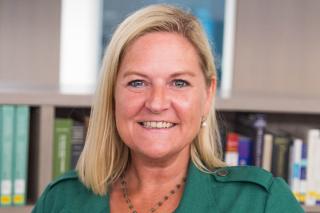Recently named Dean of the Simmons University School of Nursing, Dr. Heather Shlosser has a bold vision for a transformative future for nursing education amid the current national shortage. “The competition for highly qualified Registered Nurses (RNs) is incredibly high,” says Shlosser. “There is also a nationwide shortage of primary care and behavioral healthcare providers, which Advanced Practice Registered Nurses (APRNs) can help with, and we need to actively work to bridge that gap.”
To that end, the School of Nursing admitted twenty additional students in the Bachelor of Science in Nursing (BSN) this year, and is set to expand programmatic offerings. “The new curriculum will have an increased emphasis on leadership and critical thinking skills,” says Shlosser. “These changes will also expand on the work done in our High Fidelity Simulation Center, which provides a psychologically safe environment where students can practice their skills before they head into hospitals and other clinical placements.”
Nursing students express an enhanced sense of confidence in their abilities following their experiences in the new Simulation Center, with feedback from preceptors in local hospitals affirming that these students enter the clinical setting with adeptness in utilizing various technical equipment, such as feeding pumps, IVs, catheters, providing wound care and presenting with excellent foundational assessment and communication skills. The Center provides a unique environment where students can apply their skills hands-on, encouraging them to explore different approaches and subsequently engage in debriefing sessions to reflect on their experiences, fostering the development of critical thinking skills and bolstering their self-confidence. Additionally, the curriculum within the Simulation Center places a strong emphasis on instilling culturally competent care by imparting frameworks and effective questioning techniques, acknowledging the impossibility of truly covering every cultural background but striving to equip students with the tools to navigate diverse patient backgrounds.
For graduate students, the School of Nursing will be implementing a 16-20 month program for students with a Bachelor’s degree outside of nursing to gain their Master of Science in Nursing (MSN) degree. “Students with any bachelor's degree can become a registered nurse and leave Simmons with a master’s degree,” says Shlosser, noting that this program will likely be launched in 2025. “We’re also adding three additional tracks to the MSN, in leadership, healthcare education, and public health.” Given the demand for qualified nurses, there is also a national shortage of nursing administrators and nursing faculty. Shlosser shares that “we introduced the MSN in nursing education to expand our nursing faculty pool by offering baccalaureate-prepared faculty members an opportunity to teach in various clinical settings, simulation labs, fundamentals labs, or health assessment labs. In this program, faculty members can take one class per term for free while teaching, and the rest of their classes are offered at reduced tuition rates. Our objective is to equip nursing faculty with essential pedagogical skills, fostering excellence in their roles as advanced-level academics. Leveraging Simmons' tuition benefits, we are nearing our target of having 100% of our graduate nursing faculty hold doctoral degrees.”
The online Psychiatric Mental Health Nurse Practitioner (PMHNP) Program and the Family Nurse Practitioner Programs, which currently culminates with a master’s degree, will, in the future, result in a doctorate. “Our students will receive their MSN in one of three tracks mentioned above and then continue on to become a Family Nurse Practitioner, a Psychiatric Nurse Practitioner, or executive nurse leader at the doctoral level. This Doctor of Nursing Practice will enable our students to enter the field at the highest scope of practice.” Simmons will continue to offer post-graduate degrees for students who have already earned their MSN. “We’re setting up a pathway for students from a bachelor’s to a doctorate. Regardless of where they end their course of study, they will leave Simmons with a real foundation in leadership and a focus on education, public health, or advanced clinical practice.”
Shlosser also hopes to expand access to Dotson Bridge and Mentoring Program, an initiative offering mentorship, leadership training, volunteer opportunities, and career counseling to African American, Latina, Asian, and Native American (ALANA) students within Simmons University's nursing programs. Driven by the desire to enhance diversity in both undergraduate and graduate nursing programs for the betterment of the nursing profession, Shlosser states, "The program has demonstrated tremendous success for our scholars, aiming to address disparities in the nursing field by educating students from diverse backgrounds. Supporting their achievements benefits Simmons, the students, the nursing profession, and communities at large." President Wooten encapsulates this commitment by asserting, "When Simmons Leads, the world works better."
While the School of Nursing will separate from the College of Natural, Behavioral, and Health Sciences in the next academic year, the curriculum will remain deeply interdisciplinary in nature. This reorganization allows for specialized accreditation, ensuring compliance with nursing education standards. It provides curricular flexibility to meet the unique needs of undergraduate and graduate nursing students, accommodating distinct requirements for clinical rotations and simulations. A separate nursing school can help streamline resource allocation, directing funds and facilities toward nursing education. While maintaining autonomy, the School will be mindful of the importance of facilitating interdisciplinary collaboration with the other Simmons University schools, and fostering enriched educational experiences. The standalone structure emphasizes a focus on evidence-based nursing practice and leadership development, enhancing the professional identity of faculty and students. It amplifies visibility and recognition, aiding targeted recruitment efforts. Administrative efficiency is achieved through tailored policies within the nursing school, enabling responsive decision-making amidst changes in healthcare and educational landscapes. Moreover, a dedicated nursing school promotes active engagement with the local healthcare community, continuing to establish robust partnerships for clinical placements, collaborative research, program development, educational opportunities, and addressing community healthcare needs.

